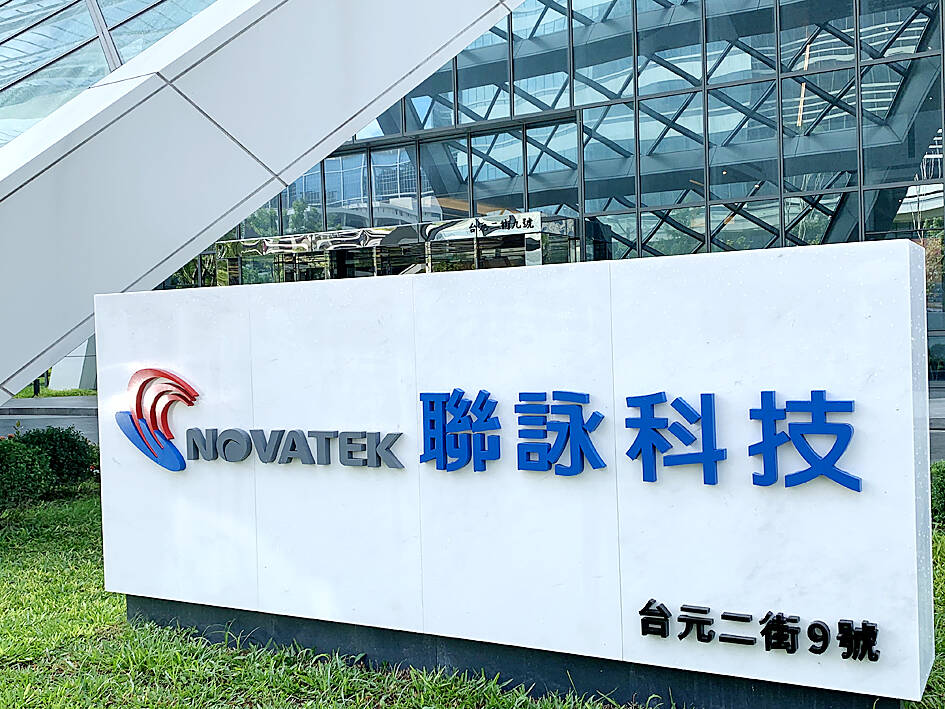Novatek Microelectronics Corp (聯詠), which designs display drive integrated circuits used in TVs and PCs, expects revenue growth to moderate this quarter due to a weakening demand for electronics in China and the ebbing front-loading demand ahead of the imposition of US tariffs.
Revenue is expected to grow 4 percent sequentially at best to US$866 million this quarter, Novatek president Steve Wang (王守仁) told an online earnings conference yesterday.
In New Taiwan dollar terms, revenue would increase as high as 2 percent sequentially to NT$27.7 billion (US$914.3 million), following a 7.35 percent rise last quarter, he said.

Photo: Grace Hung, Taipei Times
Wang attributed the mild growth to increasing demand for chips used in mobile devices.
“During the second quarter, China is letting up its subsidy program, while customers’ pull-in demand to cope with reciprocal tariff is slowing down,” Wang said. “Similarly, customers’ demand is weakening due to the tariffs’ effect.”
Novatek is closely monitoring how the tariff policy evolves and how it would weigh on consumers’ appetite for electronic devices, he said.
The recent volatility in the NT dollar’s exchange rates is worth noticing, the company said, adding that every 1 percent appreciation of the NT dollar against the US dollar would reduce its net income by about 0.2 percent.
The NT dollar has risen 7.83 percent to NT$30.295 versus the greenback since Jan. 2.
Gross margin this quarter is estimated to be between 37 percent and 40 percent, compared with 39.76 percent last quarter, Novatek said.
The company’s new organic light-emitting diodes (OLED) for touch and display driver integration (TDDI) chips were the focus of investors yesterday amid reports that the new chips are used in Apple Inc’s iPhones.
Novatek said its new OLED TDDI chips had been adopted by its customers for new smartphones launched last month.
Customers are looking at applying such new OLED TDDI chips for more models, Wang said.
However, business visibility for the second half remains unclear, Wang said, citing tariff uncertainty and the volatility of foreign exchange rates.
Novatek does not directly ship any products to the US, but it has about 17 percent of its total revenue exposed to the US market indirectly, Wang said, with products for notebook computers, automotive and TV-related products accounting for a higher percentage.
The company has not seen any abnormal changes in shipments so far as customers behave normally, he added.
Novatek’s net profit in the first quarter expanded 7.96 percent annually and 9.63 percent quarterly to NT$5.26 billion. Earnings per share rose to NT$8.65, from NT$8.04 one year ago and NT$7.89 one quarter earlier.
Gross margin rose to 39.76 percent from 39.51 percent in the prior quarter, but declined from 41.09 percent one year ago.

South Korea’s equity benchmark yesterday crossed a new milestone just a month after surpassing the once-unthinkable 5,000 mark as surging global memory demand powers the country’s biggest chipmakers. The KOSPI advanced as much as 2.6 percent to a record 6,123, with Samsung Electronics Co and SK Hynix Inc each gaining more than 2 percent. With the benchmark now up 45 percent this year, South Korea’s stock market capitalization has also moved past France’s, following last month’s overtaking of Germany’s. Long overlooked by foreign funds, despite being undervalued, South Korean stocks have now emerged as clear winners in the global market. The so-called “artificial intelligence

NEW IDENTITY: Known for its software, India has expanded into hardware, with its semiconductor industry growing from US$38bn in 2023 to US$45bn to US$50bn India on Saturday inaugurated its first semiconductor assembly and test facility, a milestone in the government’s push to reduce dependence on foreign chipmakers and stake a claim in a sector dominated by China. Indian Prime Minister Narendra Modi opened US firm Micron Technology Inc’s semiconductor assembly, test and packaging unit in his home state of Gujarat, hailing the “dawn of a new era” for India’s technology ambitions. “When young Indians look back in the future, they will see this decade as the turning point in our tech future,” Modi told the event, which was broadcast on his YouTube channel. The plant would convert

‘SEISMIC SHIFT’: The researcher forecast there would be about 1.1 billion mobile shipments this year, down from 1.26 billion the prior year and erasing years of gains The global smartphone market is expected to contract 12.9 percent this year due to the unprecedented memorychip shortage, marking “a crisis like no other,” researcher International Data Corp (IDC) said. The new forecast, a dramatic revision down from earlier estimates, gives the latest accounting of the ongoing memory crunch that is affecting every corner of the electronics industry. The demand for advanced memory to power artificial intelligence (AI) tasks has drained global supply until well into next year and jeopardizes the business model of many smartphone makers. IDC forecast about 1.1 billion mobile shipments this year, down from 1.26 billion the prior

People stand in a Pokemon store in Tokyo on Thursday. One of the world highest-grossing franchises is celebrated its 30th anniversary yesterday.